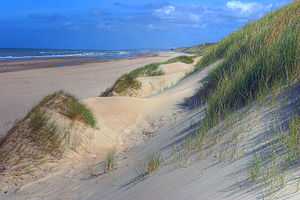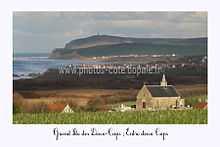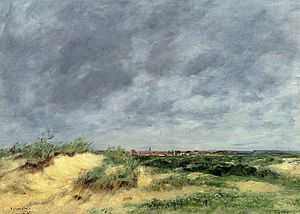Côte d'Opale
| Wikimedia Commons has media related to Côte d'Opale. |

Opal Coast (fr: Côte d'Opale) is a coast in northern France, on the English Channel, popular with tourists.
Geography
The Côte d'Opale is a French coastal region bordering Belgium, situated opposite the cliffs of the south-east of England, facing the English Channel and the North Sea.
The Côte d'Opale extends over 120 kilometres (75 mi) of coast between the Belgian border and the border with Picardy.

The Côte d'Opale contains varied landscapes like beaches, dunes, swamps, estuaries or cliffs.
The Côte d'Opale is marked by the presence of two big cliffs situated between Calais and Boulogne: the Cap Gris Nez (literally grey nose cape in English) reaching 50 metres (160 ft) and the Cap Blanc Nez (literally white nose cape in English) reaching 132 metres (433 ft). They are the closest points on the French coast to England.
Big cities
- Boulogne-sur-Mer
- Calais
- Dunkerque
Famous seaside resorts
From south to north :
- Berck
- Le Touquet-Paris-Plage
- Sainte-Cécile-Plage
- Hardelot-Plage
- Équihen-Plage
- Wimereux
- Audresselles
- Ambleteuse
- Wissant
- Blériot-Plage
- Bray-Dunes
Other communes of the coast
From south to north :
- Merlimont
- Cucq
- Saint-Étienne-au-Mont
- Le Portel
- Audinghen
- Escalles
- Marck
- Oye-Plage
- Grand-Fort-Philippe
- Gravelines
- Leffrinckoucke
- Zuydcoote
Arts

Many artists have been inspired by its landscapes, among them the composer Henri Dutilleux, the writers Victor Hugo and Charles Dickens, and the painters J. M. W. Turner, Carolus-Duran, Maurice Boitel and Eugène Boudin. It was the painter Édouard Lévêque who coined the name for this area in 1911 to describe the distinctive quality of its light.[1]
References
- ↑ Le Touquet-Paris-Plage à l’aube de son nouveau siècle, éditions Flandres-Artois-Côte d’Opale, 1982, p.22
See also
- Communauté d'agglomération du Boulonnais